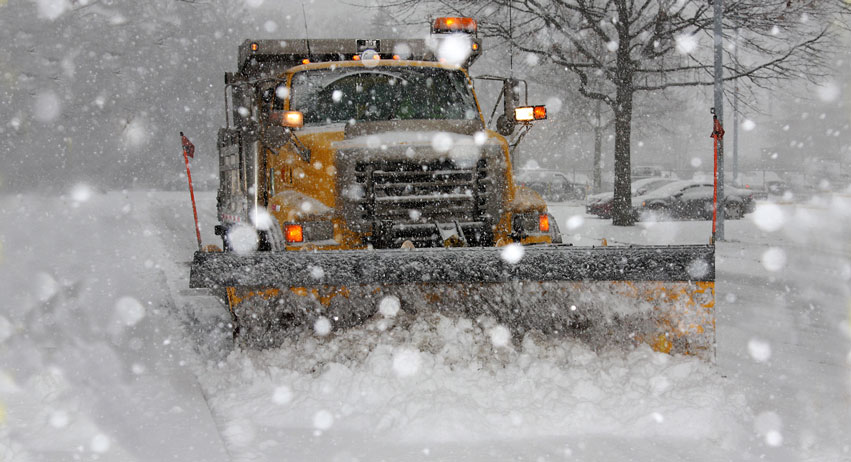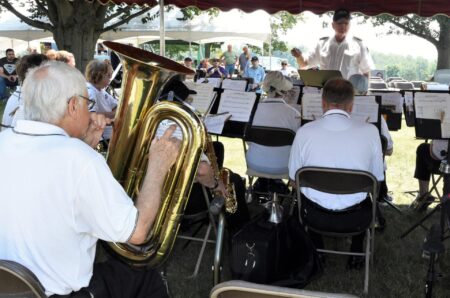STATE COLLEGE—If you are hoping for a foot of snow to blanket your backyard, you’ll probably have to wait for another storm. It appears Winter Storm Izzy will bring more of a mixed bag of precipitation.
The National Weather Service has issued a winter storm watch from Sunday afternoon through Monday afternoon for counties in Central Pennsylvania including Franklin. A watch means conditions are favorable for a winter storm event.
The NWS is predicting total snow accumulations of 4 to 7 inches, with ice accumulations of up to one tenth of an inch and wind gusts as high as 35 mph, with hazardous travel conditions expected during the storm.
“It looks like for Franklin County, you’ll see 3 to 6 inches and most of that will come Sunday late afternoon, with probably a period of moderate to heavy snow Sunday evening and then probably changing over to sleet/freezing rain and plain rain overnight and that will end up cutting down on snow totals,” said Craig Evanego, a forecaster with the National Weather Service in State College.
Evanego said snowfall rates Sunday evening could be as heavy as an inch per hour.
But the changeover will mean more slush and less fluff.
“There could be a crust of ice by Monday morning,” he said. “It could actually end as a bit of snow on the back end Monday morning before it moves out.”
High temperatures on Sunday are expected to be in the upper 20s to the low- to mid-30s by Sunday night and remain in the low- to mid-30s through the day Monday.
“It will be windy behind the storm,” Evanego said. “It looks like midweek late Wednesday or Wednesday night we may have another arctic front come across the area, which could bring rain or snow showers, but it doesn’t look like it will be much, but it will then turn sharply colder. There’s definitely a wintry week ahead.”
Travel advisories
In anticipation of snow-covered roadways, cold temperatures and high winds expected across most of the state on Sunday, the Pennsylvania Department of Transportation and Pennsylvania Turnpike Commission are advising motorists to avoid unnecessary travel during the storm.
Effective at 3 p.m. Sunday, Jan. 16, Tier 2 vehicle restrictions are planned for the following roadways:
All interstates south of Interstate 80, not including Interstate 80; PA Turnpike I-76 (Mainline) from the Ohio border to the New Jersey border, including all western extensions; PA Turnpike Northeast Extension (I-476) from I-276 to I-80; the entire length of U.S. 22; and
the entire length of Route 33.
Effective at 7 p.m. Sunday, vehicle restrictions are planned for the following roadways: all interstates north of I-80, including I-80; and PA Turnpike Northeast Extension (I-476) from I-80 to Clarks Summit.
Under Tier 2 restrictions, the following vehicles are not permitted on affected roadways: tractors without trailers; tractors towing unloaded or lightly loaded enclosed trailers, open trailers or tank trailers; tractors towing loaded tandem trailers unless there are chains or another approved Alternate Traction Device on board; enclosed cargo delivery trucks that meet the definition of a CMV; passenger vehicles (cars, SUV’s, pickup trucks, etc.) towing trailers; recreational vehicles/motorhomes; school buses, commercial buses and motor coaches; and
motorcycles.
Effective at 7 p.m. Sunday, Tier 3 restrictions are in place on I-70 east of I-79; and I-99.
Effective at 11 p.m. Sunday, Tier 3 restrictions include: I-81 north of I-84; I-84; and
I-380.
On roadways with Tier 3 restrictions in place, no commercial vehicles are permitted EXCEPT loaded single trailers with chains or approved Alternate Traction Devices. Additionally, all school buses, commercial buses, motor coaches, motorcycles, RVs/motorhomes and passenger vehicles (cars, SUVs, pickup trucks, etc.) towing trailers are not permitted on affected roadways while restrictions are in place.
In addition, the agencies anticipate implementing various speed and vehicle restrictions throughout the storm, which will be posted via variable message boards, the 511PA traveler information website and smartphone apps.
PennDOT urges motorists to avoid travel if possible.
If travel is necessary, use caution, reduce speeds and be aware of changing weather conditions. PennDOT will pre-treat roadways where necessary ahead of the storm to help prevent ice from forming a bond with the pavement during the early stages of a storm.
However, salt is not a silver bullet, and drivers may encounter icy spots on the roadway. With freezing temperatures, roads that look wet may actually be icy, and extra caution is needed when approaching bridges and highway ramps where ice can form without warning.
Motorists are encouraged to check state roadway conditions by visiting www.511PA.com.
If you must go out during the storm
Motorists who must travel for work or other purposes should prepare or restock their emergency kits with items such as non-perishable food, water, first-aid supplies, warm clothes, a blanket, cell phone charger and a small snow shovel. Motorists should tailor their kits to any specific needs that they or their families have such as baby supplies, extra medication and pet supplies.
When winter weather occurs, drivers should extra cautious around operating snow-removal equipment.
When encountering a plow truck, drivers should:
- Stay at least six car lengths behind an operating plow truck and remember that the main plow is wider than the truck.
- Be alert since plow trucks generally travel much more slowly than other traffic.
- When a plow truck is traveling toward you, move as far away from the center of the road as is safely possible, and remember that snow can obscure the actual snow plow width.
- Never try to pass or get between several trucks plowing side by side in a “plow train.” The weight of the snow thrown from the plow can quickly cause smaller vehicles to lose control, creating a hazard for nearby vehicles.
- Never travel next to a plow truck since there are blind spots where the operator can’t see, and they can occasionally be moved sideways when hitting drifts or heavy snowpack.
- Keep your lights on to help the operator better see your vehicle. Also remember that under Pennsylvania state law, vehicle lights must be on every time a vehicle’s wipers are on due to inclement weather.
Last winter in Pennsylvania, preliminary data shows that there were 301 crashes resulting in four fatalities and 143 injuries on snowy, slushy or ice-covered roadways where aggressive driving behaviors such as speeding or making careless lane changes were factors.
Power outages
Anytime a winter storm hits, there’s a chance power could be affected.
“Time spent on planning and preparing before a storm can go a long way toward keeping yourself and your family safe when severe weather hits,” said Pennsylvania Public Utility Commission Chairman Gladys Brown Dutrieuille. “Heavy snow, ice and high winds can disrupt utility service, underscoring the importance of storm preparations.”
According to the PUC, the best way to prepare is:
Know your utility hotlines. Write down, print or save toll-free outage hotlines for your electric utility and/or your natural gas utility, which are listed on your monthly bills and posted on the PUC website.
Save utility website address. Your utility’s outage reporting system can provide updates on repair and restoration efforts. Bookmark these electric utility outage sites and natural gas company websites.
Keep your cell phone charged. A well-charged phone will keep you in contact with your utility, other emergency services and family members during any power outage.
Secure supplies. Keep necessary food, medicine and other supplies on-hand, including batteries for flashlights.
Should you lose power during a storm, keep the following points in mind:
Call your utility hotline to report outages. Do not assume that the utility already knows about your outage or that others have already called. Do NOT Call 9-1-1 to report power outages. Report those to your utility. Calling 9-1-1 to report non-emergency issues like service outages can take resources away from other emergencies.
Keep clear of wires. If you see a downed power line, immediately call your electric utility and/or 9-1-1. Do NOT touch or approach any fallen lines. Stay away from objects or puddles in contact with downed power lines and do not try to remove trees or limbs from power lines. In addition, give utility crews ample room to perform their repair work – for your protection as well as theirs – and to use extra care when traveling, watching for utility crews working along streets and roads and slowing down in work areas.
Safety tips
If your power does go out for an extended period of time, households should consider the following tips to help stay safe until power is restored:
- Use flashlights or battery-operated lanterns for emergency lighting. Do not use candles or other potential fire hazards.
- Turn off lights and electrical appliances except for the refrigerator and freezer. When power comes back on, it may come back with momentary “surges” or “spikes” that can damage equipment.
- Leave one light on. After you turn the lights off, turn one lamp on so you will know when power is restored. Wait at least 15 minutes after power is restored before turning on other appliances.
- Use generators safely. If you use a generator, do NOT run it inside a home or garage or anywhere close to a window or vent. Also, connect the equipment you want to operate directly to the outlets on the generator, not your home’s electrical system, which could shock or injure utility crews working on nearby power lines. Additional generator tips are available here.
- Check on elderly neighbors and those with special needs who might need additional assistance.
Natural gas safety tips
Consumers using natural gas appliances can also be impacted by storms and caution should be taken to avoid catastrophes.
- Check gas appliances. Electric power outages can affect home appliances that operate on natural gas. If they do not function properly when power is restored, call a professional for service.
- Evacuate if you smell natural gas. Get everyone out of the building immediately.
- Leave the door open and do NOT use phones; do NOT switch lights or appliances on or off; and do NOT take any other action while inside the building.
- Call 9-1-1 from a safe location. AFTER you are safely outside, call 9-1-1 from your cell phone or neighbor’s home.




















